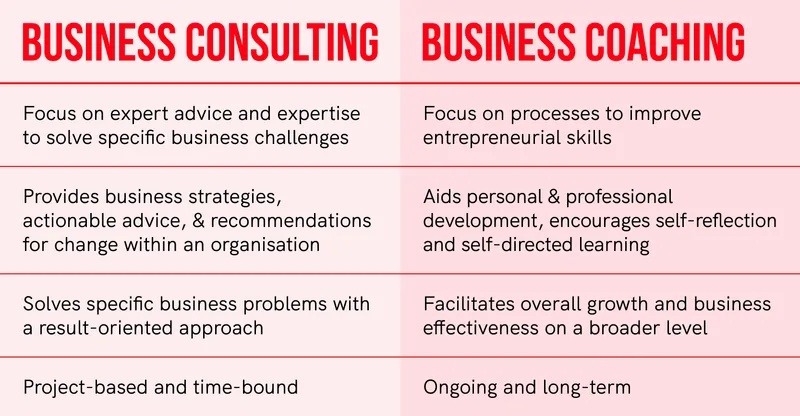What's driving MSMEs and entrepreneurs to sign up for business coaching
As entrepreneurs and MSME owners navigate the evolving business environment, they are increasingly turning to business coaches for first-hand insights into the highs and lows of entrepreneurship.
In 2015, Harvi Shah launched Bling Bag, a subscription-based jewellery store in India. Shah—an engineer by profession—had worked in the West for a couple of years, where the subscription business model was a burgeoning trend, and she thought this would be an innovative idea for the Indian market.
However, the model failed to strike a chord among Indian consumers even after four years. Caught in a tight corner, Shah realised that she needed help to steer her business in the right direction. That’s when she came across a business coaching programme, which proved to be a gamechanger for her brand and her business.
The coaching programme enabled Shah to understand that Indian customers had different aspirations and she had to pivot her business from subscription towards ecommerce. Thus began Bling Bag’s journey as a direct-to-consumer (D2C) brand, backed by strong marketing strategies. In just a year, the Mumbai-based brand’s revenue grew to Rs 1.3 crore from Rs 47 lakh in 2019.
Anyone who wants to build a business starts with an idea but they often fail due to the absence of a concrete goal, Shah tells SMBStory. She admits to have made this mistake too. But she learnt her lesson early on in her journey and was able to course correct thanks to the timely guidance from her business coach.
Entrepreneurs like Shah and owners of micro, small and medium enterprises (MSMEs) are steadily reaping the benefits of business coaching, which helps them address the challenges of today’s business environment with a renewed perspective.
For long, MSMEs ran their businesses following their own methods, rarely veering from the tried-and-tested path. However, for several, their failure to elevate their game with the changing times proved to be their Achilles' heel.
But now, entrepreneurs are keen to adapt to the vagaries of the business environment and up their game with the guidance of business coaches. The pandemic also played a significant role in accelerating this mindset shift.
The current market landscape demands agility and adaptability from businesses, making the guidance of business coaches invaluable, says Ratish Pandey, Founder of Ethique Advisory, a management consultancy and business coaching firm.
Why business coaching?
Business coaching—a popular concept in the West—is now finding takers in India too. It is a process by which a professional coach guides entrepreneurs and businesspersons in the pursuit of their work goals.
While business consulting involves a fairly direct approach to provide solutions to specific problems, coaching works on improving one’s entrepreneurial skills and ability to solve problems themselves, using tools such as goal-setting and accountability. Business coaches also rely on the coachee’s existing knowledge and encourage self-discovery and self-directed learning.

Image credits: YS Design
The coaching happens in different ways—online or offline, one-to-one or in a group, through seminars or in-business consultations, and as basic modules or advanced sessions. The pricing is based on the requirements, goals, and duration, and ranges from a few thousand rupees for small/short modules to several lakhs for advanced one-to-one coaching and larger team sessions.
There were over 71,000 professional coaches around the world in 2019, at an increase of 33% from 2015, according to data from the International Coaching Federation.
The estimated market size of the coaching industry worldwide was $20 billion in 2022. This is expected to reach $25 billion by 2025, growing 7% annually.
“It’s about learning from individuals who have experienced the highs and lows of entrepreneurship first-hand, individuals who possess practical knowledge gained through their own journeys,” says Amit Kumar, Founder of MSMEx, an education and advisory platform for small business owners.
He says these business owners do not aspire to acquire a formal degree but are looking for advanced skills in marketing, brand positioning, and product knowledge and deep industry insights to scale their “dhanda” (business).
Kumar says that in the last three years he has seen a 5X jump in enrolments for business coaching on the MSMEx platform.
Divyadeep Agarwal, Managing Director of Tayal Consultancy Services, based in Mohali, Punjab, says he prefers to learn from experts who have practical experience in entrepreneurship and running a business, rather than relying on fancy colleges where individuals with fancy degrees teach without any hands-on knowledge.
Pandey of Ethique Advisory says business coaches bring in fresh and unbiased perspectives and instil a sense of accountability in organisations, while ensuring the goals are met.
“A business coach helps entrepreneurs see their business from new angles and identify untapped opportunities,” he says.
Pandey is quick to add that business coaching programmes are not an alternative to formal business education. Business coaching helps entrepreneurs apply their understanding and knowledge in a practical and effective manner, he says.
Who needs business coaching?
Young first-gen entrepreneurs, who lack experience, are primarily the ones who are seeking the guidance of business coaches.
For instance, Kumar and his team at MSMEx have coached around 10,000 MSME owners from across India, in the sectors of manufacturing, service, and technology, and most of them are first-generation entrepreneurs.
“The ratio would be 70% new entrepreneurs and 30% next-generation leaders who are carrying the legacy of their family business,” says Kumar.
While new entrepreneurs turn to coaches for support in establishing efficient systems and processes to facilitate business scalability, business coaching helps leaders of family-run businesses think out of the box and not limit themselves to the learnings passed on from older generations.
In current times, every business needs business coaching, insists Shah of Bling Bag. Interestingly, Shah herself coaches a community of 3,400 women founders through her venture Fashionpreneur, which helps women build fashion brands.
Shah had started Fashionpreneur amid the pandemic, when she was pivoting her business from a subscription-based model to a D2C model and realised how much guidance women business owners like her need in the fashion space.

Impact of business coaching
The impact of business coaching differs from business to business based on the objectives of the entrepreneurs.
Meghana Manay, a fifth-generation entrepreneur of SR Gopal Rao Opticians, a century-old optical brand in Bengaluru, had recently signed up for both life and business coaching.
Manay says these sessions have helped her develop her skills in people management, which is an essential part of running an organisation where she has the dual responsibility of scaling the business and also keeping the family legacy intact.
“Through the coaching I am on a journey of self-discovery to set goals for the company, understand what processes to be put in place, what talent to hire to fulfil the goals, and the ways to retain them,” she says.
Business coaching has helped Agarwal of Tayal Consultancy Services understand that he has to navigate the business journey by setting goals and taking the time to scale the business, instead of rushing in to onboard investors.
Rajiv Talreja, one of Asia’s leading business coaches, a serial entrepreneur, and the founder of QL One, a desktop app designed for MSMEs, shares his experience working with the Jumboking burger chain, where his team was engaged in both consulting and coaching.
“We handheld the business owner himself and also trained his team in setting up processes, systems and structure in their organisation. We also helped Jumboking set up its marketing function and scale up using our inhouse management system, which was implemented across all franchises,” says Talreja, who has coached over 3.3 lakh MSMEs and entrepreneurs such as Dheeraj Gupta, Founder of Jumboking, and Sachin Agarwal, Partner at Massimo Batteries.
Coaching is big biz but is also unorganised
As per the research of India Coaching Federation, coaching is set to become a $7-billion industry in India by 2030. As of date, India needs around 10,000 capable coaches to serve the rising demand for coaching from people in general and from Fortune 500 corporates, says Dhirendra Gautam, Managing Director, India Coaching Federation, in a blog post.
While the market is expected to clock good growth, the sector is also largely unorganised, with the mushrooming of ‘business coaches’ making exaggerated claims.
Talreja and Shah have a word of caution for entrepreneurs: some coaches sell “dreams" to people, who are swayed by tall promises, without realising that they may not be suitable for their business. Envisioning is not harmful but mere words—without proper understanding of business needs—pose a threat, they warn.
Business owners and entrepreneurs must ensure they pick a coach who can guide them based on their requirements and aspirations and does not mislead them into chasing a pipe dream at the expense of money, time, and other resources.
Edited by Swetha Kannan







